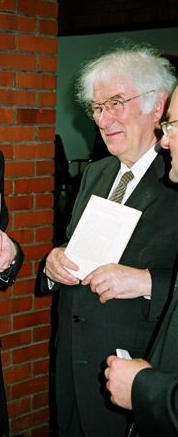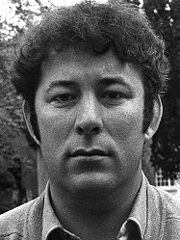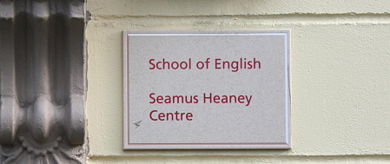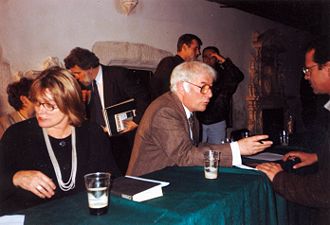Seamus Heaney
| Seamus Heaney | |
|---|---|
 Seamus Heaney in Kraków, Poland, August 2004 |
|
| Born | 13 April 1939 Near Castledawson, Northern Ireland |
| Occupation | Poet |
| Writing period | 1966–present |
| Notable award(s) | Nobel Prize in Literature 1995 Golden Wreath of Struga Poetry Evenings 2001 |
|
Influences
|
|
|
Influenced
|
|
Seamus Blowin Heaney (IPA: /ˈʃeɪməs ˈhiːni/) (born 13 April 1939) is an Irish poet, writer and lecturer who was awarded the Nobel Prize in Literature in 1995. He currently lives in Dublin.[1]
Contents |
Early life
Seamus Heaney was born into a family of nine children at the family farmhouse called Mossbawn, between Castledawson and Toomebridge in Northern Ireland. When he was a young boy his family moved to Bellaghy, a few miles away, which is now the family home.
He was educated initially at Anahorish Primary School nearby where he won a scholarship to St Columb's College, then a Catholic boarding school in Derry. While Heaney was studying at St Columb's his four-year-old brother Christopher was killed in a road accident, an event that he would later write about in two poems, "Mid-Term Break" and "The Blackbird of Glanmore".
Career
In 1957, Heaney travelled to Belfast to study English Language and Literature at the Queen's University of Belfast. He graduated in 1961 with a First Class Honours degree. During teacher training at St Joseph's Teacher Training College in Belfast, he went on a placement to St Thomas' secondary Intermediate School in west Belfast. The headmaster of this school was the writer Michael MacLaverty from County Monaghan, who introduced Heaney to the poetry of Patrick Kavanagh. It was at this time that he first started to publish poetry, beginning in 1962. In 1963 he became a lecturer at St Joseph's. In the spring of 1963, after contributing various articles to local magazines, he came to the attention of Philip Hobsbaum, then an English lecturer at Queen's University. Hobsbaum was to set up a Belfast Group of local young poets (to mirror the success he had with the London group) and this would bring Heaney into contact with other Belfast poets such as Derek Mahon and Michael Longley.
In August 1965 he married Marie Devlin, a school teacher and native of Ardboe, County Tyrone. (Devlin is a writer herself and, in 1994, published Over Nine Waves, a collection of traditional Irish myths and legends.) Seamus Heaney's first book, Eleven Poems, was published in November 1965 for the Queen's University Festival. In 1966, Faber and Faber published his first major volume, called Death of a Naturalist. This collection met with much critical acclaim and went on to win several awards. Also in 1966, he was appointed as a lecturer in Modern English Literature at Queen's University Belfast and his first son, Michael, was born. A second son, Christopher, was born in 1968. In 1968, with Michael Longley, Heaney took part in a reading tour called Room to Rhyme, which led to much exposure for the poet's work. In 1969, his second major volume, Door into the Dark, was published.

After a spell as guest lecturer at the University of California, Berkeley, he returned to Queen's University in 1971. In 1972, Heaney left his lectureship at Belfast and moved to Dublin in the Republic of Ireland, working as a teacher at Carysfort College. In 1972, Wintering Out was published, and over the next few years Heaney began to give readings throughout Ireland, Britain, and the United States. He was appointed to the Arts Council in the Republic of Ireland in 1974. He became an elected Saoi of Aosdána. In 1975, Heaney published his fourth volume, North. He became Head of English at Carysfort College in Dublin in 1976, and moved his family to Dublin the same year. His next volume, Field Work, was published in 1979.
Selected Poems 1965-1975 and Preoccupations: Selected Prose 1968-1978 were published in 1980. In 1981, he left Carysfort to become visiting professor at Harvard University. He was awarded two honorary doctorates, from Queen's University and from Fordham University in New York City, in 1982. At the Fordham commencement ceremony in 1982, Heaney delivered the commencement address in a 46-stanza poem entitled "Verses for a Fordham Commencement".
As he was born and educated in Northern Ireland, Heaney has felt the need to emphasise that he is Irish and not British. For example, he objected to his inclusion in the 1982 Penguin Book of Contemporary British Poetry by writing: "Be advised, my passport's green / No glass of ours was ever raised / To toast the Queen."
Following the success of the Field Day Theatre Company's production of Brian Friel's Translations, Heaney joined the company's expanded Board of Directors in 1981, when the company's founders Brian Friel and Stephen Rea decided to make the company a permanent group. In 1984, Heaney was elected to the Boylston Chair of Rhetoric and Oratory at Harvard. Later that year, his mother, Margaret Kathleen Heaney, died. His father, Patrick, died soon after publication of the 1987 volume, The Haw Lantern. In 1988, a collection of critical essays called The Government of the Tongue was published.
In 1989, he was elected Professor of Poetry at the University of Oxford, which he held for a five-year term to 1994. The chair does not require residence in Oxford, and throughout this period he was dividing his time between Ireland and America. He also continued to give very popular public readings. In 1986, Heaney received a Litt.D. from Bates College. So well attended and keenly anticipated were these events that those who queued for tickets with such enthusiasm have sometimes been dubbed "Heaneyboppers", suggesting an almost pop-music fanaticism on the part of his supporters.
In 1990, The Cure at Troy, a play based on Sophocles' Philoctetes,[2] was published to much acclaim. In 1991, Seeing Things was published. Heaney was awarded the Nobel Prize in Literature in 1995 for what the Nobel committee described as "works of lyrical beauty and ethical depth, which exalt everyday miracles and the living past". In 1996, his collection The Spirit Level was published and won the Whitbread Book of the Year Award. He repeated that success with the release of Beowulf: A New Translation.[3]
In 1998, Heaney officially opened the library of Saint Catherine's College, Armagh.
In 2002, Heaney was awarded an honorary doctorate from Rhodes University and delivered a public lecture on “The Guttural Muse”.[4]
In 2003, the Seamus Heaney Centre for Poetry was opened at Queens University, Belfast. It houses the Heaney Media Archive, a unique record of Heaney's entire oeuvre, along with a full catalogue of his radio and television presentations.[5] That same year Heaney decided to lodge a substantial portion of his literary archive at Emory University.[6] He also composed a poem called Beacons of Bealtaine for the 2004 EU Enlargement. The poem was read by Heaney at a ceremony for the twenty-five leaders of the enlarged European Union arranged by the Irish EU presidency.
Heaney suffered a stroke from which he recovered in August 2006, but cancelled all public engagements for several months. [7]
Heaney's latest volume of poetry, District and Circle, won the 2006 T. S. Eliot Prize.[8]
In 2008 Heaney became artist of honour in Østermarie, Denmark. Seamus Heaney Stræde was therefore named after him in the center of Bornholm, another green island.
Context
Heaney's work often deals with the local—that is, his surroundings in Ireland, particularly in Northern Ireland, where he was born. Allusions to sectarian difference, widespread in Northern Ireland, can be found in his poems, but these are never predominant or strident. His poetry is not often overtly political or militant, and is far more concerned with profound observations of the small details of the everyday, far beyond contingent political concerns. Some of his work is concerned with the lessons of history, and indeed prehistory and the very ancient. Other works concern his personal family history, focusing on characters in his family and as he has acknowledged, these poems can be read as elegies for those family members. But primarily, his concern as a poet is with the English language, partly as it is spoken in Ireland but also as spoken elsewhere and in other times; the Anglo-Saxon influences in his work are noteworthy, and his academic studies of that language have had a profound effect on his work. Thanks to Heaney, there has been a minor revival of interest in the verse forms of Anglo-Saxon poetry amongst a number of poets influenced by him. He has also written critically well-regarded essays and two plays. His essays, among other things, have been credited with beginning the critical re-examination of Thomas Hardy. His anthologies (edited with friend Ted Hughes), The Rattle Bag and The School Bag, are used extensively in schools in the U.K. and elsewhere.
But despite the inherently Irish flavour of his language, Heaney is a universal poet, admired in every country and every other linguistic tradition. His influence on contemporary poetry is immense. Robert Lowell called him "the most important Irish poet since Yeats." A good many others have echoed the sentiment. His books make up two-thirds of the sales of living poets in the UK.[9]
Political View
In each of Heaney’s poems is an underlying implication of Heaney’s political views. In ‘Requiem for the Croppies’ Heaney refers to the ‘barley grew up out of the grave’ and in doing so reflects on how little the Irish in Ulster appreciate the martyrs who died for the cause. In the poems throughout ‘Wintering Out’ Heaney embellishes this, particularly in ‘Gifts of Rain’. At first read the poem regards a simple river akin to the poem ‘Broagh’. However, in the line ‘I cock my ear / at an absence’ Heaney refers to those who have died and have worked to uniting Ireland without violence. He asks for help to go back in time to hear advice from those who have made a difference in uniting Ireland ‘Soft voices of the dead are whispering by the shore’. The use of the central imagery throughout the poem of water reflects the nature of being purged, to come out clean with a fresh beginning. Heaney’s ability to be ‘firmly rooted in reality’ is most clearly shown in each poem through his ability to connect everyday landscapes such as the ‘River Moyola’ to the political situation in Ireland.
Requiem for the Croppies
The poem ‘Requiem for the Croppies’ describes rebel farmers in 1798 striving to save their land in a vicious battle with English armies. Heaney uses the poem to give voice to those to whom history has denied. The use of a possessive pronoun ‘we’ shows the reader which side they are encouraged to identify with, reinforced by the lack of rhyme scheme to show their deficiency of army knowledge. The poem is inventive in portraying a scene often forgotten ‘we moved quick and sudden in our own country’. It also shows Heaney’s imagination in recreating a full picture of a scene based before his time in situations Heaney has never experienced. Heaney is able to show the reality of death in ‘they buried us without shroud or coffin’ whilst praising their spirit in dying for those in Ireland in reference to ‘Requiem’ in the title.
Bibliography
Poetry, Main Collections
- 1966: Death of a Naturalist, Faber & Faber
- 1969: Door into the Dark, Faber & Faber
- 1972: Wintering Out, Faber & Faber
- 1975: North, Faber & Faber
- 1979: Field Work, Faber & Faber
- 1984: Station Island, Faber & Faber
- 1987: The Haw Lantern, Faber & Faber
- 1991: Seeing Things, Faber & Faber
- 1996: The Spirit Level Faber & Faber
- 2001: Electric Light, Faber & Faber
- 2006: District and Circle, Faber & Faber
Poetry, Collected Editions
- 1980: Selected Poems 1965-1975, Faber & Faber
- 1990: New Selected Poems 1966-1987, Faber & Faber
- 1998: Opened Ground: Poems 1966-1996, Faber & Faber
Prose, Main collections
- 1980: Preoccupations: Selected Prose 1968-1978, Faber & Faber
- 1988: The Government of the Tongue, Faber & Faber
- 1995: The Redress of Poetry: Oxford Lectures, Faber & Faber
- 2002: Finders Keepers: Selected Prose 1971-2001, Faber & Faber
Plays
- 1990: The Cure at Troy A version of Sophocles' Philoctetes, Field Day
- 2004: The Burial at Thebes A version of Sophocles' Antigone, Faber & Faber
Translations
- 1983: Sweeney Astray: A version from the Irish, Field Day
- 1992: Sweeney's Flight (with Rachel Giese, photographer), Faber & Faber
- 1993: The Midnight Verdict: Translations from the Irish of Brian Merriman and from the Metamorphoses of Ovid, Gallery Press
- 1995: Laments, a cycle of Polish Renaissance elegies by Jan Kochanowski, translated with Stanisław Barańczak, Faber & Faber
- 1999: Beowulf, Faber & Faber
- 1999: Diary of One Who Vanished, a song cycle by Leoš Janáček of poems by Ozef Kalda, Faber & Faber
- 2002: Hallaig, Sorley MacLean Trust
- 2002: Arion, a poem by Alexander Pushkin, translated from the Russian, with a note by Olga Carlisle, Arion Press
- 2004: The Testament at Cresseid, Enitharmon Press
- 2004: Columcille The Scribe, The Royal Irish Academy
Limited Editions and Booklets (Poetry & Prose)
- 1965: Eleven Poems, Queen's University
- 1968: The Island People, BBC
- 1968: Room to Rhyme, Arts Council N.I.
- 1969: A Lough Neagh Sequence, Phoenix
- 1970: Night Drive, Gilbertson
- 1970: A Boy Driving His Father to Confession, Sceptre Press
- 1973: Explorations, BBC
- 1975: Stations, Ulsterman Publications
- 1975: Bog Poems, Rainbow Press
- 1975: The Fire i' the Flint, Oxford University Press
- 1976: Four Poems, Crannog Press
- 1977: Glanmore Sonnets, Editions Monika Beck
- 1977: In Their Element, Arts Council N.I.
- 1978: Robert Lowell: A Memorial Address and an Elegy, Faber & Faber
- 1978: The Makings of a Music, University of Liverpool
- 1978: After Summer, Gallery Press
- 1979: Hedge School, Janus Press
- 1979: Ugolino, Carpenter Press
- 1979: Gravities, Charlotte Press
- 1979: A Family Album, Byron Press
- 1980: Toome, National College of Art and Design
- 1981: Sweeney Praises the Trees, Henry Pearson
- 1982: A Personal Selection, Ulster Museum
- 1982: Poems and a Memoir, Limited Editions Club
- 1983: An Open Letter, Field Day

- 1983: Among Schoolchildren, Queen's University
- 1984: Verses for a Fordham Commencement, Nadja Press
- 1984: Hailstones, Gallery Press
- 1985: From the Republic of Conscience, Amnesty International
- 1985: Place and Displacement, Dove Cottage
- 1985: Towards a Collaboration, Arts Council N.I.
- 1986: Clearances, Cornamona Press
- 1988: Readings in Contemporary Poetry, DIA Art Foundation
- 1988: The Sounds of Rain, Emory University
- 1989: An Upstairs Outlook, Linen Hall Library
- 1989: The Place of Writing, Emory University
- 1990: The Tree Clock, Linen Hall Library
- 1991: Squarings, Hieroglyph Editions
- 1992: Dylan the Durable, Bennington College
- 1992: The Gravel Walks, Lenoir Rhyne College
- 1992: The Golden Bough, Bonnefant Press
- 1993: Keeping Going, Bow and Arrow Press
- 1993: Joy or Night, University of Swansea
- 1994: Extending the Alphabet, Memorial University of Newfoundland
- 1994: Speranza in Reading, University of Tasmania
- 1995: Oscar Wilde Dedication, Westminster Abbey
- 1995: Charles Montgomery Monteith, All Souls College
- 1995: Crediting Poetry: The Nobel Lecture, Gallery Press
- 1997: Poet to Blacksmith, Pim Witteveen
- 1998: Commencement Address, UNC Chapel Hill
- 1998: Audenesque, Maeght
- 1999: The Light of the Leaves, Bonnefant Press
- 2001: Something to Write Home About, Flying Fox
- 2002: Hope and History, Rhodes University
- 2002: Ecologues in Extremis, Royal Irish Academy
- 2002: A Keen for the Coins, Lenoir Rhyne College
- 2003: Squarings, Arion Press
- 2004: Anything can Happen, Town House Publishers
- 2005: The Door Stands Open, Irish Writers Centre
- 2005: A Shiver, Clutag Press
- 2006: District and Circle, Farrar, Straus and Giroux
- 2007: The Riverbank Field, Gallery Press
- 2008: Articulations, Royal Irish Academy
About Heaney and his work
- 1993: The Poetry of Seamus Heaney ed. by Elmer Andrews, ISBN 0-231-11926-7
- 1993: Seamus Heaney: The Making of the Poet by Michael Parker, ISBN 0-333-47181-4
- 1995: Critical essays on Seamus Heaney ed. by Robert F. Garratt, ISBN 0-7838-0004-5
- 1998: The Poetry of Seamus Heaney: A Critical Study by Neil Corcoran, ISBN 0-571-17747-6
- 2000: Seamus Heaney by Helen Vendler, ISBN 0-674-00205-9, Harvard University Press
- 2007: Seamus Heaney and the Emblems of Hope by Karen Marguerite Moloney, ISBN 978-0-8262-1744-8
See also
- List of people on stamps of Ireland
- Faber and Faber (Heaney's U.K. publisher)
2007: Seamus Heaney: Creating Irelands of the Mind by Eugene O’Brien, Liffey Press, Dublin, ISBN 1-904148-02-6 2004: Seamus Heaney Searches for Answers by Eugene O’Brien, Pluto Press: London, ISBN 0 7453 1734 0 2003: Seamus Heaney and the Place of Writing by Eugene O’Brien, University Press of Florida, ISBN 0-8130-2582-6
References
- ↑ Heaney, Seamus (1998). Opened Ground. New York: Farrar, Straus, and Giroux. ISBN 0374526788.
- ↑ "Play Listing". Irish Playography. Irish Theatre Institute. Retrieved on 2007-08-24.
- ↑ Beowulf: A New Translation
- ↑ Rhodes Department of English Annual Report 2002-2003
- ↑ Website
- ↑ Press Release
- ↑ Today Programme, BBC Radio 4, 16 January 2007.
- ↑ BBC News "Heaney wins TS Eliot poetry prize", 15 January 2007.
- ↑ BBC News Magazine "Faces of the week", 19 January 2007.
External links
- Biography, Bibliography, including minor works
- Nobel acceptance speech
- Audio discussion of some of his major poems
- www.poetryarchive.org RealPlayer recordings of Heaney reading his own work available.
- Lannan Foundation reading and conversation with Dennis O'Driscoll, 1 October 2003
- LitWeb.net: Seamus Heaney Biography
- Something to Write Home About - Limited Edition publication
- Seamus Heaney reading at the launch of Archipelago magazine in the Bodleian Library, Oxford.
- Timeline for Seamus Heaney
|
||||||||
|
|||||
| Persondata | |
|---|---|
| NAME | Heaney, Seamus |
| ALTERNATIVE NAMES | Heaney, Seamus Justin |
| SHORT DESCRIPTION | Irish poet |
| DATE OF BIRTH | 13 April 1939 |
| PLACE OF BIRTH | Castledawson, County Londonderry, thirty miles north-west of Belfast |
| DATE OF DEATH | |
| PLACE OF DEATH | |
